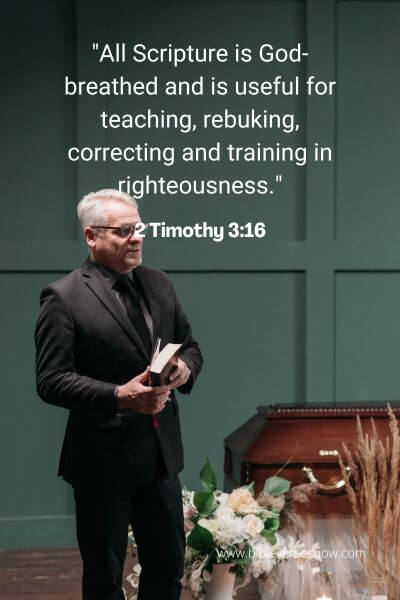A pastor’s work is sometimes difficult and complex as they attempt to lead and guide their flock in a way consistent with biblical principles. On the other hand, pastors are not immune to criticism, as their behavior and decisions may be scrutinized by members of their congregation or others.
While constructive feedback and accountability are essential for pastors to develop and improve, criticism can often be hurtful. In this post, we will look at numerous Bible verses that address criticizing pastors, providing insight and help for dealing with this often-sensitive issue.
Bible Verses About Criticizing Pastors
1. Ephesians 4:29
“Do not let any unwholesome talk come out of your mouths, but only what is helpful for building others up according to their needs, that it may benefit those who listen.”

2. Galatians 6:1
“Brothers and sisters, if someone is caught in a sin, you who live by the Spirit should restore that person gently. But watch yourselves, or you also may be tempted.”

3. Matthew 7:1-2
“Do not judge, or you too will be judged. For in the same way you judge others, you will be judged, and with the measure you use, it will be measured to you.”

4. 2 Timothy 3:16
“All Scripture is God-breathed and is useful for teaching, rebuking, correcting and training in righteousness.”

5. James 5:16
“Therefore, confess your sins to each other and pray for each other so that you may be healed. The prayer of a righteous person is powerful and effective.”

6. Hebrews 13:17
“Obey your leaders and submit to their authority. They keep watch over you as men who must give an account. Obey them so that their work will be a joy, not a burden, for that would be of no advantage to you.”

The Importance of Constructive Criticism in the Bible
7. Proverbs 12:1
“Whoever loves discipline loves knowledge, but whoever hates correction is stupid.”

8. Proverbs 27:5-6
“Better is open rebuke than hidden love. Wounds from a friend can be trusted, but an enemy multiplies kisses.”

9. Proverbs 27:17
“As iron sharpens iron, so one person sharpens another.”

10. Psalm 141:5
“Let the righteous one strike me—it is a kindness; let him rebuke me—it is oil for my head; let my head not refuse it.” –

11. James 4:17
“If anyone, then, knows the good they ought to do and doesn’t do it, it is sin for them.”
12. Galatians 6:1
“Brothers and sisters, if someone is caught in a sin, you who live by the Spirit should restore that person gently. But watch yourselves, or you also may be tempted.”
Biblical Guidelines for Criticizing Pastors
13. 1 Timothy 5:19
“Do not entertain an accusation against an elder unless it is brought by two or three witnesses.”
14. Colossians 4:6
“Let your conversation be always full of grace, seasoned with salt, so that you may know how to answer everyone.”
15. Matthew 5:23-24
“Therefore, if you are offering your gift at the altar and there remember that your brother or sister has something against you, leave your gift there in front of the altar. First go and be reconciled to them; then come and offer your gift.”
16. 1 Timothy 1:5
“The goal of this command is love, which comes from a pure heart and a good conscience and a sincere faith.”
17. Ephesians 4:29
“Do not let any unwholesome talk come out of your mouths, but only what is helpful for building others up according to their needs, that it may benefit those who listen.”
18. James 4:11
“Brothers and sisters, do not slander one another. Anyone who speaks against a brother or sister or judges them speaks against the law and judges it. When you judge the law, you are not keeping it, but sitting in judgment on it.”
The Consequences of Unjust Criticism in the Bible
19. Matthew 7:1-2
“Do not judge, or you too will be judged. For in the same way you judge others, you will be judged, and with the measure you use, it will be measured to you.”
20. Romans 14:19
“Let us therefore make every effort to do what leads to peace and to mutual edification.”
21. Proverbs 10:18
“Whoever conceals hatred with lying lips and spreads slander is a fool.”
22. Ephesians 4:26
“In your anger do not sin: Do not let the sun go down while you are still angry.”
23. Proverbs 16:28
“A perverse person stirs up conflict, and a gossip separates close friends.”
24. Proverbs 12:18
“The words of the reckless pierce like swords, but the tongue of the wise brings healing.”
Jesus’ Example of Addressing Leaders with Love and Respect
25. Matthew 20:25-28
“Jesus called them together and said, ‘You know that the rulers of the Gentiles lord it over them, and their high officials exercise authority over them. Not so with you. Instead, whoever wants to become great among you must be your servant, and whoever wants to be first must be your slave—just as the Son of Man did not come to be served, but to serve, and to give his life as a ransom for many.”
26. John 8:7
“When they kept on questioning him, he straightened up and said to them, ‘Let any one of you who is without sin be the first to throw a stone at her.”
27. Matthew 5:44
“But I say to you, love your enemies and pray for those who persecute you.”
28. Luke 10:27
“He answered, ‘Love the Lord your God with all your heart and with all your soul and with all your strength and with all your mind’; and, ‘Love your neighbor as yourself.”
29. Romans 12:14
“Bless those who persecute you; bless and do not curse.”
30. 1 Corinthians 13:1
“If I speak in the tongues of men or of angels, but do not have love, I am only a resounding gong or a clanging cymbal.”
How to Approach Criticism in a Biblical Manner
31. Matthew 6:15
“But if you do not forgive others their sins, your Father will not forgive your sins.”
32. Ephesians 4:25
“Therefore each of you must put off falsehood and speak truthfully to your neighbor, for we are all members of one body.”
33. Philippians 2:5
“In your relationships with one another, have the same mindset as Christ Jesus.”
34. James 5:16
“Therefore confess your sins to each other and pray for each other so that you may be healed. The prayer of a righteous person is powerful and effective.”
35. Matthew 18:15
“If your brother or sister sins, go and point out their fault, just between the two of you. If they listen to you, you have won them over.”
36. James 1:19
“My dear brothers and sisters, take note of this: Everyone should be quick to listen, slow to speak and slow to become angry.”
Balancing Accountability and Grace When Criticizing Pastors
37. Galatians 6:2
“Carry each other’s burdens, and in this way you will fulfill the law of Christ.”
38. Philippians 2:3
“Do nothing out of selfish ambition or vain conceit. Rather, in humility value others above yourselves.”
39. 1 Thessalonians 5:11
“Therefore encourage one another and build each other up, just as in fact you are doing.”
40. Philippians 4:5
“Let your gentleness be evident to all. The Lord is near.”
41. Colossians 3:12
“Therefore, as God’s chosen people, holy and dearly loved, clothe yourselves with compassion, kindness, humility, gentleness and patience.”
42. 1 Peter 4:8
“Above all, love each other deeply, because love covers over a multitude of sins.”
The Role of Forgiveness in Criticizing Pastors
43. Matthew 6:14
“For if you forgive other people when they sin against you, your heavenly Father will also forgive you.”
44. Colossians 3:13
“Bear with each other and forgive one another if any of you has a grievance against someone. Forgive as the Lord forgave you.”
45. Matthew 18:21-22
“Then Peter came to Jesus and asked, ‘Lord, how many times shall I forgive my brother or sister who sins against me? Up to seven times?’ Jesus answered, ‘I tell you, not seven times, but seventy-seven times.'”
46. Luke 6:37
“Do not judge, and you will not be judged. Do not condemn, and you will not be condemned. Forgive, and you will be forgiven.”
47. 1 John 1:9
“If we confess our sins, he is faithful and just and will forgive us our sins and purify us from all unrighteousness.”
48. Ephesians 4:32
“Be kind and compassionate to one another, forgiving each other, just as in Christ God forgave you.”
What Does The Bible Say About Criticizing Pastors
The Bible encourages us to be respectful and submissive to those in authority positions while holding them accountable for their actions and teaching.
One specific passage that addresses the issue of criticizing pastors is found in 1 Timothy 5:19-20, which says: “Do not entertain an accusation against an elder unless it is brought by two or three witnesses. But those elders who are sinning you are to reprove before everyone, so that the others may take warning.”
This passage suggests that we should not be quick to criticize or make accusations against pastors or other church leaders without evidence to support our claims.
However, suppose we have evidence of wrongdoing or sin. In that case, we should address it directly with the pastor or elder in question and if necessary, bring it before the church community for further action.
The Bible teaches us to approach pastors and other leaders respectfully and humbly while holding them accountable for their actions and teachings.
What Does The Bible Say About Talking Bad About Pastors
While criticism and disagreement are natural and healthy parts of any community, speaking badly about spiritual leaders can have serious consequences for both the individuals involved and the community as a whole.
One of the most famous passages in the Bible about speaking negatively about spiritual leaders is found in the book of Exodus.
In this passage, Moses leads the Israelites through the desert, and his brother Aaron and sister Miriam speak out against him, saying that they should have just as much authority as he does. God hears their complaints and responds by punishing Miriam with a skin disease.
This passage is often cited as a warning against speaking negatively about spiritual leaders. The punishment that Miriam receives is seen as a symbol of the harm that can come from criticizing or undermining those who are meant to lead us spiritually.
Similarly, in the book of Proverbs, several verses warn against speaking negatively about those in authority. Proverbs 17:27-28 says, “He who knows spares his words, and a man of understanding is of a calm spirit.
Even a fool is counted wise when he holds his peace; when he shuts his lips, he is considered perceptive.” This verse suggests that it is wise to hold our tongues and avoid speaking out of turn, especially when it comes to those in positions of authority.
Likewise, in the New Testament, several passages warn against speaking negatively about spiritual leaders. In 1 Timothy 5:19-20, for example, we read, “Do not receive an accusation against an elder except from two or three witnesses. Those who are sinning rebuke in the presence of all, that the rest also may fear.”
This passage suggests that it is essential to have evidence before making accusations against spiritual leaders and that such charges should be made in a public forum so that others can learn from them.
Overall, the Bible seems to suggest that speaking negatively about pastors and other spiritual leaders is unwise and potentially dangerous. While criticism and disagreement are natural parts of any community, it is important to approach such issues with humility, respect, and a willingness to listen and learn from one another.
Doing so can create a healthy and vibrant spiritual community that honors God and those who lead us in His name.
Conclusion
The Bible provides instruction on how to tackle the problem of pastor criticism. While valid complaints or difficulties must be addressed, they must be done so in a polite and constructive manner, with the goal of building up rather than tearing down.
As Christians, we are obligated to hold our leaders accountable while still honoring and respecting them. In the end, we should seek God’s wisdom and guidance in all things, including how we engage with our pastors and church leaders.
We may handle this sensitive matter honoring both God and our fellow believers by prayer, discernment, and a spirit of humility.







